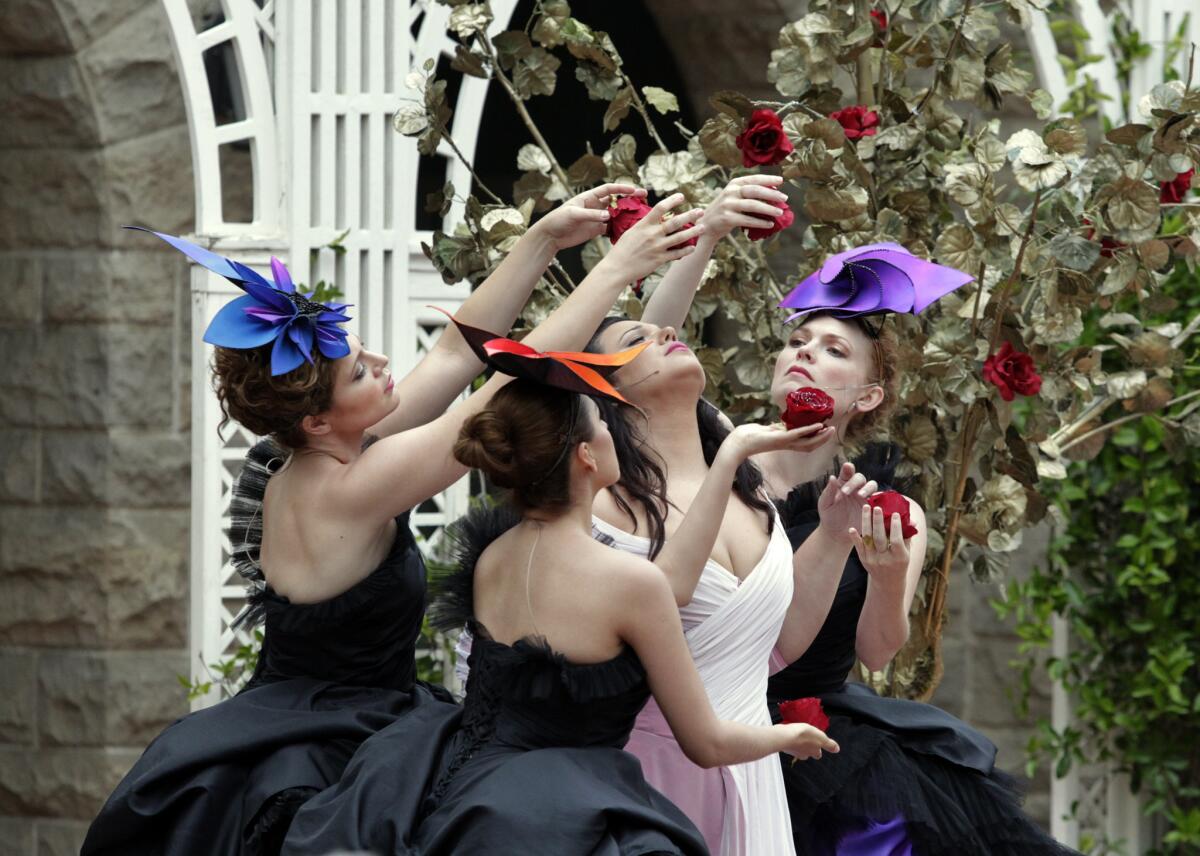Review: ‘La Hija de Rappaccini’s’ passionate exoticism

Vincent Price once lived on Swallow Drive, just up the hill from the Greystone Mansion in Beverly Hills, in a house full of art. The actor, who was both connoisseur and also the deliriously over-the-top investigator of evil as the mad Dr. Rappaccini in the 1963 horror flick“Twice-Told Tales,” needed but drive five minutes to enter into the enthralling grip of one of the most refined gardens in the county.
Would Price have been right for the title character of Gotham Opera’s production of “La Hija de Rappaccini,” an early opera by Daniel Catán that had an unusual outdoor performance at Greystone just before sunset Saturday? The opera and a segment of the film both take their impetus from Nathaniel Hawthorne’s tale, “Rappaccini’s Daughter,” in which a scientist cultivates poisonous plants in his desire to manipulate mankind. I like the image of the Master of Menace, as Price was dubbed, wandering among the manicured horticulture that oil baron Edward L. Doheny was once able to cultivate thanks to his exploiting local and Mexican markets.
The story is of an Italian scientist, Rappaccini, and his most extravagant bloom, his lovely daughter Beatrice, raised on poison and now herself lethal. A young medical student arrives in medieval Padua and falls in love with her, but to touch her is to die.
PHOTOS: Arts and culture in pictures by The Times
Catán’s opera was inspired by Octavio Paz’s play based on Hawthorne’s short story. The Mexican poet and Nobel laureate traced the origins of the tale to India, and Catán went even further afield than that musically.
A popular Mexican composer who later settled in South Pasadena until his sudden death from heart failure at 62 two years ago, Catán found inspiration in “Rappaccini” from modernist Mexican literature, Japanese film and ancient court music, along with Indonesian gamelan. In “Rappaccini,” Catán also discovered his inner Puccini.
Sensuous vocal lines sung in Spanish convey the sickly, sexy passion of the opera’s lovers and the perverse gardener. The orchestra is a field of ravishing exotica, which alludes to the sinuous call of the Japanese flute and the glamorous clangor of the gamelan. It’s as if all the world is out to seduce, which means — as we’ve now learned in the age of globalization and massive Internet overreaching — danger lurks.
Some but not all of that came through at Greystone. The production was imported from New York by the Broad Stage in Santa Monica, which is excitingly branching out. Gotham, a venturesome small company that finds intriguing sites to stage opera, first mounted “Rappaccini” last month in the Brooklyn Botanic Garden. With an orchestra impractical, the company used the occasion to premiere the composer’s version of the opera for two pianos, elaborate percussion and harp. Especially harp. Catán wrote the extensive part for his wife, Andrea Puente Catán, who played it brilliantly Saturday.
As staged by Rebecca Taichman, Gotham’s “Rappaccini” was treated as tidily as Doheny’s formal gardens. Anita Yavich’s period costumes were standard issue except for colorfully racy ones for three women who are meant to be voices of alluring flowers. Staged on what was once the mansion’s pool area, there wasn’t much in the way of overgrown foliage. A bed was the main prop.
CRITICS’ PICKS: The best art and classical music in town
Amplification at Greystone proved relatively crude, and the instrumental ensemble and conductor (Neal Goren) were a considerable distance from the stage. Balances sounded artificial, as though they were whatever a sound designer wanted them to be.
Still, much of what makes this opera remarkable managed to come through. However much sweetness and color orchestration loses in the clangorous chamber version, marvelous percussive effects create a different kind of exoticism, such as the harp glissandi contrasting with glissandi of strummed strings inside the piano.
The opera revolves mainly around the physical and psychological dissolution of Giovanni, the medical student whose idealism is threatened by his impossible attraction to Beatriz, as she is called in Spanish. Tenor Daniel Montenegro fell apart convincingly and lustfully.
Soprano Elaine Alvarez offered a Beatriz more regal than hothouse but able to soar. Baritone Eric Dubin’s Rappaccini was stalwart rather than campily creepy (but that’s creepy too). Tenor Brian Downen was sympathetic as the doctor who provides a hopeful anecdote to Beatriz’s poisoned blood that ends up killing her. Ariana Wyatt, Cassandra Zoe Velasco and Nora Graham-Smith, the tamely enticing voices of the flowers, were also their personifications, slinking around Giovanni.
Site-specific opera is all the rage, and simply sitting outdoors in a beautiful late afternoon overcast light while a rare summer rain threatened created a sure sense of operatic occasion. And if for Gotham going outside the box didn’t mean throwing away the packing material or really smelling the dangerous, desirable roses, at least the company is helping keep alive an opera with significant implications for our time.
More to Read
The biggest entertainment stories
Get our big stories about Hollywood, film, television, music, arts, culture and more right in your inbox as soon as they publish.
You may occasionally receive promotional content from the Los Angeles Times.











